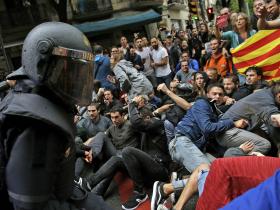FAR FROM OVER – CATALANS
The Spanish government shouldn’t get too excited by Puigdemont’s arrest – the Catalan fight for independence is far from over.
It should be remembered that the Catalan independence movement is not without sympathy in a Europe going through transition and the rise of powerful regional blocs within member states.
Carles Puigdemont organised a summit soon after fleeing to Belgium – ahead of his arrest and appearance before a Madrid court on charges of treason – to plan how he can return to Catalonia and take up his position as the head of Europe’s newest state.
Those attending went to the Ghent opera house for a performance of the Duke of Alba before the meeting got under way. But any inspiration and hope Puigdemont and his advisors may have drawn from the tale of the 16th Century Spanish general’s brutal reign in Flanders ending ultimately in defeat must now be fading away.
The leader of the Catalan separatists is under arrest in Germany on an international warrant issued by a Madrid court for alleged sedition, rebellion and misuse of public funds – charges which carry a possible sentence of 25 years imprisonment. He has already announced that he had abandoned plans to return to the presidency of the Catalan regional parliament, let alone lead an independent nation.
Warrants have also been issued against other Catalan politicians who escaped Spain – Clara Ponsati, who is in Scotland teaching at the University of St Andrews, Lluis Puig, Meritxell Serret and Toni Comin, who went to Belgium with Puigdemont, and Marta Rovira and Anna Gabriel, who fled to Switzerland. Nine others, including Oriol Junqueras and Jordi Turull, a candidate for the Catalan presidency, remain in Spanish prisons.
Just four months after two elections and an independence referendum, alarm over the breakup of Spain, fracturing the European Union, and claims of foreign (inevitably Russian) interference in the Catalan crisis, it is claimed, is over with the government of Mariano Rajoy holding the whip hand.
The separatist parties – having between them won the majority of the seats in the last election in December – have failed to form a regional government because, say critics, of their traditional and chronic disunity and infighting. Even Puigdemont’s declaration that he would form a government in exile, a fairly meaningless concept at the outset, is now likely to come to nothing in the short term.
They should not crow too soon. The hardline stance of Madrid has helped buttress the separatist cause in the recent past, just when it looked to be fraying.
I remember the disillusionment on the Barcelona streets on the day Puigdemont, after repeatedly assuring that he would be there to lead Catalonia as president in the struggle which lay ahead, fled to Belgium. The Rajoy government could, at that stage, have offered sympathy and reconciliation to the Catalans, aspired to the moral high ground. Instead, it took the punitive path, refusing bail and jailing those Catalan leaders who had not fled abroad, but had turned up abiding by the law to answer the charges against them in Madrid courts.
The resultant outrage in Catalonia to what was seen as acts of vindictiveness undoubtedly strengthened the nationalist cause. There had been a similar boost when the Guardia Civil, sent in by Madrid on the day of the referendum called by the separatists, laid into the public, firefighters and even members of the local police force. Time and again I came across people, during the election which followed, who wanted to stress that they were going to cast their vote for the separatists in protest at brutal acts which brought back grim memories of Franco’s times.
There have been violent clashes in Barcelona and other Catalan cities after Puigdemont’s arrest and demonstrations are set to continue. There is the very real risk that the separatists, seeing their leaders incarcerated, may turn towards violence, with political parties losing influence to extremists.
Puigdemont is due to appear before a German court. The German authorities have 60 days to decide whether to extradite him to Spain, the period reduced to 10 days if he surrenders to face prosecution.
There is, however, no absolute certainty that Germany will extradite Puigdemont. The Spanish government withdrew an international warrant when he was in Belgium because some of the charges against him were not compatible with the Belgian criminal code. Germany will only agree to extradite if there is similar compatibility with German law on the charges. One immediate sticking point is that there is no general offence of “rebellion” in the German code and one can only be found guilty of “high treason” if there is use or threat of force. Puigdemont’s lawyers can argue that only violent force used during the independent referendum came from the Spanish state.
It should also be remembered that the Catalan independence movement is not without sympathy in a Europe going through transition and the rise of powerful regional blocs within member states.
In Scotland, First Minister Nicola Sturgeon, speaking about the warrant issued against Ponsati, reiterated her government’s support for the “Catalan people to determine their own future” stressing “the fact that our justice system is legally obliged to follow due process in the determination of extradition requests does not change that view”. In Germany the Suddeutsche Zeitung newspaper called Puigdemont the country’s “first political prisoner” and warned that the arrest – “which was not smart” – may unify Catalan secessionists and drag the European Union into bitter Spanish internal politics.
It is highly unlikely that Puigdemont will be leading his supporters back in Catalonia anytime soon. But there is a long while to go yet before the fat lady sings and the dreams of Catalan independence are over.
![]()

